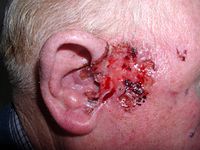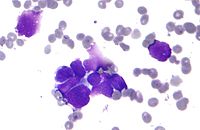
Local Excision for the Treatment of Penile Verrucous Carcinoma
Sign Up to like & getrecommendations! Published in 2017 at "Urology Case Reports"
DOI: 10.1016/j.eucr.2017.03.021
Abstract: Penile verrucous carcinoma is known for its favorable biologic behavior and lack of metastatic potential. For preservation of function, treatment has been focused on partial penectomy. Despite partial penectomy for preservation of minimal functional and… read more here.
Keywords: verrucous carcinoma; local excision; carcinoma; treatment ... See more keywords

Recalcitrant lip verrucous carcinoma successfully treated with acitretin after carbon dioxide laser ablation
Sign Up to like & getrecommendations! Published in 2018 at "JAAD Case Reports"
DOI: 10.1016/j.jdcr.2018.02.002
Abstract: CO2: carbon dioxide OVC: oral verrucous carcinoma PDT: photodynamic therapy INTRODUCTION Verrucous carcinoma is a rare variant of welldifferentiated squamous cell carcinoma with locally aggressive and minimal metastatic potential. Oral verrucous carcinoma (OVC) is themost… read more here.
Keywords: laser ablation; verrucous carcinoma; carcinoma; carbon dioxide ... See more keywords

Photodynamic therapy with acitretin for treatment of Penile verrucous carcinoma.
Sign Up to like & getrecommendations! Published in 2020 at "Photodiagnosis and photodynamic therapy"
DOI: 10.1016/j.pdpdt.2020.102047
Abstract: Penile verrucous carcinoma exhibits a high potential for recurrence. Traditional treatment for penile verrucous carcinoma is radical surgery. Extensive resection generally leads to the loss of the patient's sexual function and limits the tolerance of… read more here.
Keywords: verrucous carcinoma; treatment; photodynamic therapy; penile verrucous ... See more keywords

Caveats in the diagnosis of suspected non‐endemic verrucous carcinoma in the urinary bladder
Sign Up to like & getrecommendations! Published in 2022 at "BJU International"
DOI: 10.1111/bju.15715
Abstract: Three months later, the man underwent follow-up flexible cystoscopy in the outpatient clinic. At this point, a voluminous necrotic excrescency was noted, growing from the right side of the bladder where the previous primary tumour… read more here.
Keywords: bladder; diagnosis suspected; verrucous carcinoma; suspected non ... See more keywords

Syringocystadenoma papilliferum associated with verrucous carcinoma of the skin in the same lesion: Report of four cases
Sign Up to like & getrecommendations! Published in 2019 at "Journal of Cutaneous Pathology"
DOI: 10.1111/cup.13572
Abstract: The association of syringocystadenoma papilliferum (SCAP) with verrucous carcinoma (VC) of the skin in the same lesion is a rare, but well‐documented event. Although human papillomaviruses (HPV) have been proposed to have an etiologic role… read more here.
Keywords: verrucous carcinoma; syringocystadenoma papilliferum; carcinoma skin; skin lesion ... See more keywords

Verrucous Carcinoma of the Foot: A Retrospective Study of 19 Cases and Analysis of Prognostic Factors Influencing Recurrence.
Sign Up to like & getrecommendations! Published in 2022 at "Cutis"
DOI: 10.12788/cutis.0499
Abstract: This study sought to evaluate a cohort of patients with verrucous carcinoma of the foot with special focus on 5 cases of locally recurrent tumors despite negative margins. Nineteen cases of verrucous carcinoma of the… read more here.
Keywords: verrucous carcinoma; foot retrospective; recurrence; foot ... See more keywords

Radiation vs surgery for early-stage laryngeal verrucous carcinoma: A population-based propensity score matched-study
Sign Up to like & getrecommendations! Published in 2022 at "PLOS ONE"
DOI: 10.1371/journal.pone.0275271
Abstract: Background Verrucous carcinoma (VC) is a rare variant of squamous cell carcinoma. Although VC is considered radioresistant, concrete evidence for this is absent. Methods We obtained data on VC treated with surgery or radiation from… read more here.
Keywords: radiation surgery; verrucous carcinoma; propensity score; radiation ... See more keywords

Verrucous carcinoma of the vulva: diagnosis and treatment*
Sign Up to like & getrecommendations! Published in 2017 at "Anais Brasileiros de Dermatologia"
DOI: 10.1590/abd1806-4841.20174929
Abstract: Vulvar cancer accounts for less than 1% of malignancies in women. Verrucous carcinoma of the vulva is a rare histological variation, comprising less than 1% of vulvar cancer cases. Although it is characterized as being… read more here.
Keywords: verrucous carcinoma; carcinoma vulva; diagnosis treatment; vulva diagnosis ... See more keywords

Oral Verrucous Carcinoma: A Diagnostic and Therapeutic Challenge
Sign Up to like & getrecommendations! Published in 2023 at "Radiology and Oncology"
DOI: 10.2478/raon-2023-0015
Abstract: Abstract Background Verrucous carcinoma is a low-grade variant of squamous cell carcinoma with specific morphologic, cytokinetic and clinical features. Despite low mitotic activity and slow growth, it can infiltrate adjacent tissues in advanced stages but… read more here.
Keywords: therapeutic challenge; carcinoma diagnostic; verrucous carcinoma; oral verrucous ... See more keywords

Crafting a prognostic nomogram for the overall survival rate of cutaneous verrucous carcinoma using the surveillance, epidemiology, and end results database
Sign Up to like & getrecommendations! Published in 2023 at "Frontiers in Endocrinology"
DOI: 10.3389/fendo.2023.1142014
Abstract: Background The aim of this study was to establish and verify a predictive nomogram for patients with cutaneous verrucous carcinoma (CVC) who will eventually survive and to determine the accuracy of the nomogram relative to… read more here.
Keywords: verrucous carcinoma; cutaneous verrucous; nomogram; overall survival ... See more keywords

BCL-X expression in oral cancer: Comparison between oral squamous cell carcinoma and verrucous carcinoma
Sign Up to like & getrecommendations! Published in 2018 at "Indian Journal of Dental Research"
DOI: 10.4103/ijdr.ijdr_711_16
Abstract: Background: Verrucous carcinoma (VC) should be considered a distinct clinicopathologic entity different from the more common oral squamous cell carcinoma (OSCC) because of its unique biological behavior. Best way to understand the behavior of these… read more here.
Keywords: verrucous carcinoma; carcinoma; oral squamous; squamous cell ... See more keywords